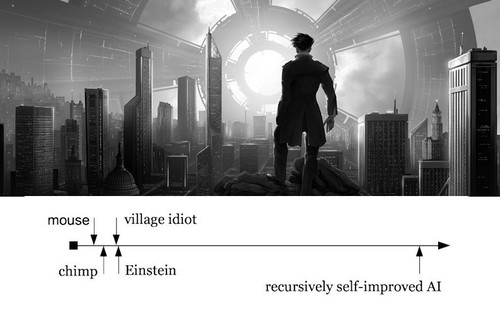See on Scoop.it – Amazing Science
Why are AIs in movies so often of roughly human-level intelligence? One reason is that we almost always fail to see non-humans as non-human. We anthropomorphize. That’s why aliens and robots in fiction are basically just humans with big eyes or green skin or some special power. Another reason is that it’s hard for a writer to write characters that are smarter than the writer. How exactly would a superintelligent machine solve problem X?
The human capacity for efficient cross-domain optimization is not a natural plateau for intelligence. It’s a narrow, accidental, temporary marker created by evolution due to things like the slow rate of neuronal firing and how large a skull can fit through a primate’s birth canal. Einstein may seem vastly more intelligent than a village idiot, but this difference is dwarfed by the difference between the village idiot and a mouse.
As Vernor Vinge put it: The best answer to the question, “Will computers ever be as smart as humans?” is probably “Yes, but only briefly.”[1] How could an AI surpass human abilities? Let us count the ways:
- Speed. Our axons carry signals at seventy-five meters per second or slower. A machine can pass signals along about four million times more quickly.
- Serial depth. The human brain can’t rapidly perform any computation that requires more than one hundred sequential steps; thus, it relies on massively parallel computation.[2] More is possible when both parallel and deep serial computations can be performed.
- Computational resources. The brain’s size and neuron count are constrained by skull size, metabolism, and other factors. AIs could be built on the scale of buildings or cities or larger. When we can make circuits no smaller, we can just add more of them.
- Rationality. As we explored earlier, human brains do nothing like optimal belief formation or goal achievement. Machines can be built from the ground up using (computable approximations of) optimal Bayesian decision networks, and indeed this is already a leading paradigm in artificial agent design.
- Introspective access/editability. We humans have almost no introspective access to our cognitive algorithms, and cannot easily edit and improve them. Machines can already do this (read about EURISKO and metaheuristics). A limited hack like the method of loci greatly improves human memory; machines can do this kind of thing in spades.
1Vernor Vinge, “Signs of the Singularity,” IEEE Spectrum, June 2008, http://spectrum.ieee.org/biomedical/ethics/signs-of-the-singularity.
2J. A. Feldman and Dana H. Ballard, “Connectionist Models and Their Properties,” Cognitive Science 6 (3 1982): 205–254, doi: 10.1207/s15516709cog0603_1.
See on intelligenceexplosion.com
